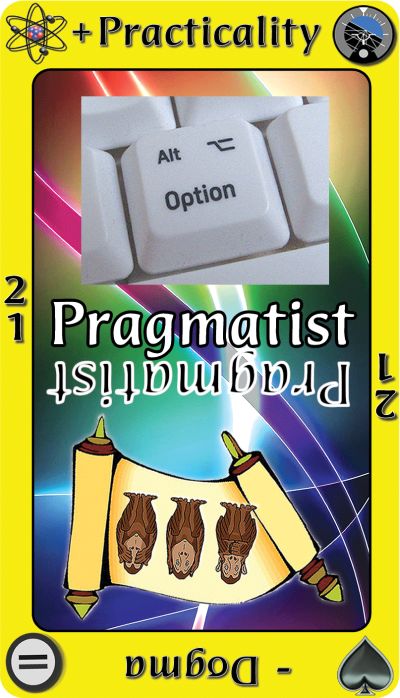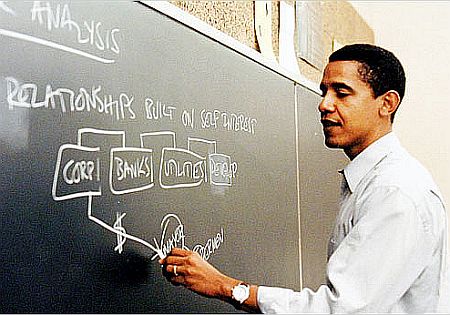21 Pragmatist

“Do what you can, with what you have, where you are.”
Theodore Roosevelt, 26th US President
Symbols & Color
- The Atom: Scholar Set and Background Image and
- Aerial Altitude Meter: Attitude Group
- Equipoise: Symbol of Neutrality – All things being equal.
- The Spade: Assimilative Axis
- Border Color: Yellow – Scholar Set
Implications of the Upright Position or Positive Pole
Practicality is always searching for alternative options. The choice of one of them isn’t necessarily the optimal, or the most moral, or even the most profitable, just the one most simple to explain. Even though it is trying to get all of those aspects, it often sacrifices some of each to reach a workable solution. The Pragmatist is the consummate bargainer. In this pole, they are seeking advancement even if they give-up or give-in to get some things they wanted, in order to capture a larger goal. William James, the founder of the philosophical school of Pragmatism, defines its application by asking a question, “Grant an idea or belief to be true,” it says, “what concrete difference will its being true make in anyone’s actual life?” In the positive pole, effectiveness is always a greater concern than the expediency of so-called “cost-efficiency” alone. The former takes in consequences, the latter looks for an easy way to deflect them. Pragmatist, Barack Obama, has become well known for this style of trade and yield, he managed to put in place a health care program that is the most comprehensive in American history – although imperfect for containing many concessions to market inefficiencies! Arguably, a trademark strategy of the Pragmatist is to move things along by choosing the option they deem most optimal at the moment. It is about breaking through impasse and moving toward a solution. The motto in this pole might be: “all things being equal.” The positive pole of this Overleaf is by nature open to variability realizing that new or hybrid options might indeed produce greater utility. Much of technological development is predicated on this stated maxim. By contrast, negative pole Pragmatists believe that if you are the nail that stands out,
you will invite the hammer. Indeed, any deviation from the rule requires beating it down into conformity.
Card messages in the Illuminated position.
+ Practical
(minimalist, functional, efficient, flexible, systematic, utilitarian, adaptive)
- “It must be” the one that works or otherwise forget it. Be practical and get the job done. But movement is the intention. If you have a log jam what steps could you initiate to get it moving again? Hint: do nothing and the real issue floats to the surface!
- If one option doesn’t work, then try another one. Practicality assimilates whatever needs to continue movement to the desired outcome. Don’t make any deals now that you can’t pay for right away. Emphasis function over form.
- Do the best with what you have. Find the quickest path to completion from there.
- Emphasize function over form. Make deals based on that. It will pay dividends right away.
- Shared gains and sacrifices make for the most pragmatic solution. The only win-win happens when everyone does NOT get everything they want in an exchange. Make sure to distill exactly what you need and the rest is bonus.
- When opportunity knocks, answer the call. Open the door to new possibilities at this time. They might not return again. In fact, you might be looking at a once-in-a-lifetime offer.
- If the thing, person, move, or a line of thinking doesn’t seem to have utility, then drop it and move on to something that addresses the immediate concerns.
- Don’t make any deals now that you can’t pay for right away. Emphasize function over form.
- The quickest way between two points is a straight line. You may have to leave something unnecessary out of the equation.
- A Pragmatist can relate to the following statement, “I can usually come up with the easiest way to do something.” Try on this mindset to see what ideas yield. It might break a stalemate.
Quotes signifying this pole
- “Some people are pragmatists, taking things as they come and making the best of the choices available. Some people are idealists, standing for principle and refusing to compromise. And some people just act on any whim that enters their heads. I pragmatically turn my whims into principles.” Bill Watterston – Calvin & Hobbes
- “Ask yourself at every moment, ‘Is this necessary?'” Marcus Aurelius, Roman Emperor
- “Pragmatism asks its usual question. ‘Grant an idea or belief to be true,’ it says. What concrete difference will its being true make in anyone’s actual life? How will the truth be realized? What experiences will be different from those which would obtain if the belief were false? What, in short, is the truth’s cash-value in experiential terms?” (A Pragmatist in the MT himself.) William James – American Philosopher
Implications of the Reversed Position or Negative Pole
To be a follower of any dogma, even those who see the fraud or the folly of a choice, or perspective, are depicted as the three wise monkeys of Japanese lore: “see no evil, hear no evil, speak no evil.” The choice of this image also notes when this attitude is shrouded in fear it suggests the mistaken strategy, “it is better to go along, and get along, than disagree and be trounced upon.” Therein lays the strategy of the Pragmatist in this pole: ‘make no waves’ – just get the job done. “So it is written. So it shall be.” This might as well be the motto of the negative pole Pragmatist. Don’t actually think about, or try to create, or
bargain for other possibilities; rely on standards already tried (but frequently not true), but represent the group think of a Dogma. In the modern era, the credo of convenience, substituting steps with an ‘easy-to-use’ strategy, tool, or slogan; which defeats creativity, manual skills sets which our brain’s evolution is based, and critical thinking as one passively takes as-granted It is easy to confuse the choice of the most expedient, the “quick fix” option, one that serves only as workaround to a problem; and decide to call it a real solution. Neutrality, in the form of substitution, is more slippery than actual objectivity or impartiality. Adherence or constriction to a doctrine in filtering decisions may seem appropriate to a theory, but its reuse of fixed ideas buries consequence under slogans and anesthetizes the
mind from dissenting opinions.
Card messages in the Shadow position.
+ Dogmatic
(functionary, narrow, expedient, inflexible, Pedantic, particular, fussy, fixated, codified, familiar, accustomed, persnickety)
- Occam’s Razor is based upon the dogma that the simplest explanation is usually the right one. Nice idea, often not true in reality. Is dogma constricting knowledge into something that fits a mold or restricts options? Stop making the square peg fit into the round hole! Try something outside your comfort zone.
- All one need to do to see the down-side of convenience of any of the new “life improving”, “time saving”, “easy-to-use” technologies of modern inventions, is to confront their instructions. One almost has to be a Scholar to grasp the base level ideas being presented you should understand, to make these things operate. How much time did you have to spend programming a device? In the end, was the machine or you that was programmed?
- Sticking with the “straight and narrow” might be a sound precept except when you drive your car into a wall. Learn how to change course and take a different turn.
- Stop making the square peg fit into the round hole. Just because you want something to work, does not make it so! Try something outside your familiar set of options.
- An opportunist is skulking around looking for an opening, like a fox searching for a hole into the chicken coop. Act in advance and in accordance with the old Pragmatist adage “an once of prevention is worth a pound of cure.” Take steps before the fox not only leaves you with no eggs, but with no chickens either.
- Famed novelist of Brave New World, Aldous Huxley, said, “The worst enemy of life, freedom and the common decencies is total anarchy; the second worst enemy is total efficiency.” Without some limits, some constraint, some principles, you have nothing but rule by fiat (whim of the powerful) i.e “because we said so!” Do not fall into the mechanical pragmatism or more colloquially “if it’s good for the goose, it’s good for the gander.” That is that one-size-fits-all standardization and not organic reality.
- Just remember that rules are generalization trying to encapsulate situations and reduce them down to one thing. You are being challenged to either reject a rule that that is being inappropriately applied or to find the right rule which does. A person is lobbying hard for their position but is still not proving their point.
- You might want to consider your Codes of Ethics more like guidelines rather than strict rules. Guerilla style warfare is an example of this approach.
- Bill Watterston, the creator of Calvin & Hobbes cartoon strip presents us with a useful contrast of consideration, “Some people are pragmatists, taking things as they come and making the best of the choices available. Some people are idealists, standing for principle and refusing to compromise. And some people just act on any whim that enters their heads. I pragmatically turn my whims into principles.” Be aware if you’ve inventing some expedient ethics to rationalize your decision.
- Few Overleaves embrace credo, “one-size-fits-all” like the negative pole of this Attitude. This is an example of the old philosophical method of reductionism said in Latin as “reductio ad absurdum” which implies that an idea or argument has been reduced to an absurd level of oversimplification. Imaging everyone in the world all having to wear size 9 shoes? Both LaBron James and Shirley Temple would be a bit underserved…everyone would. Yet, when it comes to many ways we view people or situations, here no one is questioning the blanket assumptions that are being asserted. Dogma often smells the same way the word it might trigger by sound association, dog shit. And just like the way so many people who allow their little pooch to leave their ideas on the ground for someone else to step in. To sniff out someone you might try the first, Gold-Plated Rule, of pragmatism: “Would I want someone else doing what I’m about to do, done to me?” If you asked the question, answered it honestly, then you have just risen to the positive pole of this Attitude. Congratulations! The result might not yield less crap in the world, but it is at least honestly account for, bagged-up, and not left around for other people to deal with. Negative pole Pragmatism is ALWAYS happy to shift the consequence to someone else. It is the expedient thing to do!
- Expedient acts are those that usually cut corners for short-run benefit, but all too often come back to haunt you, or at least cost you, in the long run.
Quotes signifying this pole
- “The self-styled practical man of affairs who pooh-poohs philosophy as a lot of windy notions is himself a pragmatist or a positivist, and a bad one at that , since he has given no thought to his position.” Alan Watts
- “Fools ignore complexity. Pragmatists suffer it. Some can avoid it. Geniuses remove it.” Alan Perlis
- “You win some. You lose some.” Anonymous. An aphorism about attempting anything in life.
Relevance in the Michael Teaching
 As the Assimilative Attitude, Pragmatist (ism) is the means by which we distill from the mind not truth, but functionality. Essence chooses the Pragmatist Overleaf when it desires a Personality to be interested in achieving results more than pursuing an ideal. Retrospectively, this Attitude may facilitate the integration and completion of unfinished or unrefined tasks from other lifetimes. In such a case, a Pragmatist may be bogged down with various notions and repetitive habits which are in need of a solvent. You might call it the instinctive dogma of repetition and memory.
As the Assimilative Attitude, Pragmatist (ism) is the means by which we distill from the mind not truth, but functionality. Essence chooses the Pragmatist Overleaf when it desires a Personality to be interested in achieving results more than pursuing an ideal. Retrospectively, this Attitude may facilitate the integration and completion of unfinished or unrefined tasks from other lifetimes. In such a case, a Pragmatist may be bogged down with various notions and repetitive habits which are in need of a solvent. You might call it the instinctive dogma of repetition and memory.
Whenever a Pragmatist, or a self-styled or self proclaimed one is on the scene, it is difficult not to notice their tendency to come up with solutions which supposedly work; usually for them. Yet, a positive pole Pragmatist notices specifics and integrates those variations into a patterned approach thus tailoring whatever method it proclaims as efficient or in the modern era “cost effective”. Incorporating a general method to specific applications that similar problems could are handled in the same way. The Pragmatist may be quite consumed more with the appearance of some narrow definition of efficiency than the long term efficacy or equity of his approach. In other words, what is defined as Pragmatic may be very skewed, subjective and reductionist; especially when expressing in the negative pole.
Famous Examples
Barack Obama, Dick Cheney, David Suskind, Sybil Shepherd, George Bush Sr., Marshal McLuhan, Angela Lansbury, Ho Chi Min, Dustin Hoffman, Lily Tomlin,
Cultural Relevance
Change is inevitable, how we go about it and whether we do it effectively is another matter. Pragmatism as a philosophical approach is based on this premise. Reviling only inefficiency and wasted motion, it is often more concerned with how to manage change rather than which direction it should take. Bureaucrats depending upon their life perspectives and values exemplify this attitude in the most institutional way.
On the other end of the scale, short cuts for short term gains are justified in the name of practicality. Somehow “things will handle themselves” or “it will all work itself out” becomes default buzz phrase justification and then excuses for slipshod but fast acting solutions that achieve movement toward something the user wants. Wall Street in the financial hey day prior to the Crisis of 2008, was negative pragmatism beating the drum and chanting the dogma of neo-liberalism with a bet on and against every investment mentality that seemed to cover every contingent: A dream come true until the nightmare of realism set in to pop the inflated bubble. So much for utilitarian values when it came to government acting as the nursemaid healing the financial sector; inefficiency was rewarded with bailouts. While homeowners, investors, small business owners, and people who lost jobs and pensions, were left holding the bag on Main Street.
 The hypocrisy illustrates how anything can be placed under the heading of pragmatic while never having to be efficacious, streamlined, monitored, or authentically objective in a “bottom line” way or implemented in a businesslike manner. The rush to proclaim oneself as practical, at the highest levels of public debate, serves more frequently as a cover for exploitation and doctrinaires that applied competence and impartiality. What are called principles, usually hide a worn out, rehashed tradition that failed in its time of origination, but gained some sentimental or substantial support for those who gained by it. Pragmatism has devolved into a state of managed chicanery within which few benefit while imposing rules, austerity and one-size fits all solutions upon others.
The hypocrisy illustrates how anything can be placed under the heading of pragmatic while never having to be efficacious, streamlined, monitored, or authentically objective in a “bottom line” way or implemented in a businesslike manner. The rush to proclaim oneself as practical, at the highest levels of public debate, serves more frequently as a cover for exploitation and doctrinaires that applied competence and impartiality. What are called principles, usually hide a worn out, rehashed tradition that failed in its time of origination, but gained some sentimental or substantial support for those who gained by it. Pragmatism has devolved into a state of managed chicanery within which few benefit while imposing rules, austerity and one-size fits all solutions upon others.
In the modern age, political triangulation is the way that several recent presidents have attempted to escape party bickering by placing themselves in a third, outside position. Attempting to take the stage as the reconciler, the practical alternative to polarized positions, politicians do what makes their positions more ambiguous and the American system of government less effective, they confuse the issue by pretending to be something they are not. Why? Because, to the negative pole Pragmatist, winning is more important than principles. That is the credo for the Young Soul Era in which we live.
Your Attitude might be a Pragmatist if…
- Often, I see the key sticking point in a situation.
- I can usually come up with the easiest way to do something.
- I like doing things in the most simple way.
- I believe that I am efficient in most of what I do.
- Inefficiency really bothers me in whatever is happening.
- In a given situation, I can assume the point of view of someone else in order to counterbalance the situation.
- I may not have any specific position, but how things get done and way it sounds to me must be consistent.

